中职英语基础模块下unit6定语从句
中职英语-基础模块-下-unit 6 reading说课材料
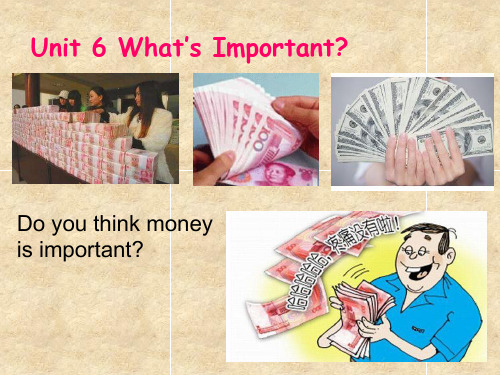
crazy turn green common struggle ma’am terrible memory fail key guard cheer up shy nervous Well done! You are great!
adj.疯狂的;着迷的 嫉妒
adj.普遍的,常见的 v.& n.搏斗,争斗;奋斗,努力 n.女士,夫人 adj.极不好的;可怕的;糟糕的 n.记忆力,记性 v.衰退,衰弱 n.钥匙;关键;答案 n.警卫 振作起来!加油!
a. having money to buy or pay for sth. b. the thing, person, situation that people pay
special attention to c. a long hard fight to get something d. telling the true e. a statement in which someone complains
remind的用法: remind sb. of sth. ; remind sb. that …使某人想起…… remind sb to do sth. … 提醒某人做某事。
它让我想到了我最好的朋友。
It reminds me of my best friend.
请提醒我完成工作。
Please remind me to finish my work.
n.社会,社团
be different from
与……不同
focus
n.焦点;集中点;注意的中心
fashionable adj.流行的,时髦的
distinction
n.区分,区别
at the same time
职业高中英语基础模块下册unit-6-What's-important教学内容
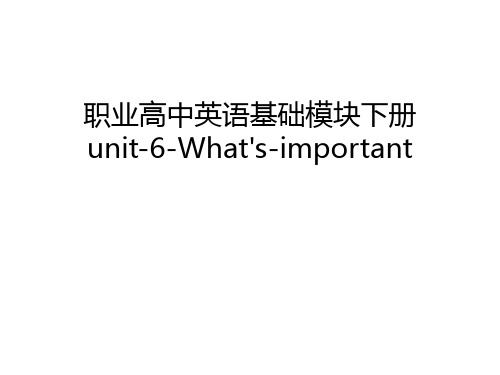
5. Whose 即可指人,也可指物,在定语 从句中作定语,相当于of whom∕ of which.
eg. The young man whose mother works in a middle school is a worker. 母亲在中学工 作的那个年轻人是个工人,
The woman (whom) you saw in my room yesterday is my mother. 你昨天在我房间见 到的那个妇女是我的母亲。
Do you know the young woman (whom) we met at the gate?你认识 我们在大门口遇 见的那个青年妇女吗?
I’ve read the newspaper that (which) carries the editorial.我已 经看过登载那篇社论的那份报纸。(作主语,指物)
The letter that (which) I received yesterday is from my family.我 昨天收到的那封信是我家里来的。(作宾语,指物,可省去)
2. 作宾语
eg. The man whom you want to see has come. 你要见的那个人已经来了。
This is the hospital that we visited yesterday. 这是我们昨天参观的医院。
The letter which I received yesterday was from a friend of mine.我昨天收到的那封信是 我的一个朋友寄来的。
【2024版】外研版中职国规英语教材基础模块第二册第6单元
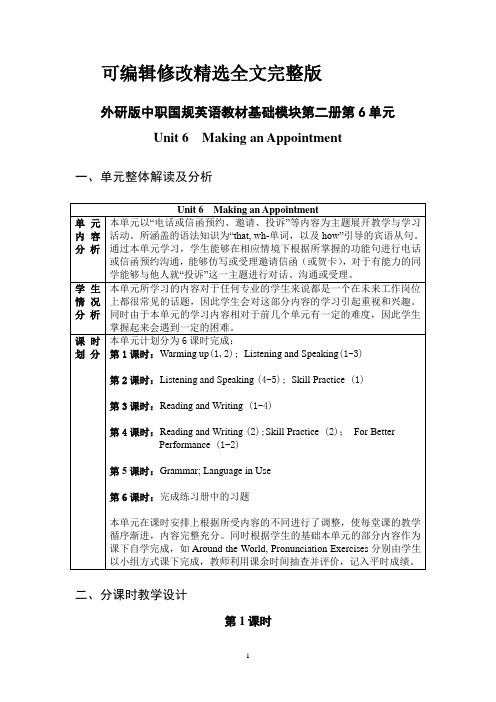
可编辑修改精选全文完整版
外研版中职国规英语教材基础模块第二册第6单元Unit 6 Making an Appointment
一、单元整体解读及分析
二、分课时教学设计
第1课时
第2课时
第3课时
第4课时
第5课时
第6课时
作者简介:陈开宇,1995年毕业于首都师范大学英语教育专业,现任北京电子科技职业学院英语教师,副教授职称。
曾多次主编教材,在2009年参加了国家规划教材外研版《中职英语》基础模块一的编写。
工作十多年期间,曾多次主持或参加院、市级课题,参加北京市或全国英语教学比赛,并获得一、二等奖等,此外,曾多次在期刊杂志发表文章。
最新中职英语基础模块教案:Unit6英语
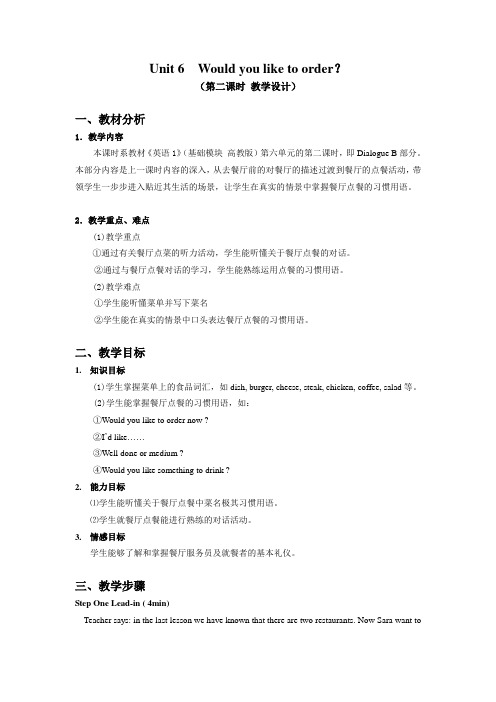
Unit 6 Would you like to order?(第二课时教学设计)一、教材分析1.教学内容本课时系教材《英语1》(基础模块高教版)第六单元的第二课时,即Dialogue B部分。
本部分内容是上一课时内容的深入,从去餐厅前的对餐厅的描述过渡到餐厅的点餐活动,带领学生一步步进入贴近其生活的场景,让学生在真实的情景中掌握餐厅点餐的习惯用语。
2.教学重点、难点(1)教学重点①通过有关餐厅点菜的听力活动,学生能听懂关于餐厅点餐的对话。
②通过与餐厅点餐对话的学习,学生能熟练运用点餐的习惯用语。
(2)教学难点①学生能听懂菜单并写下菜名②学生能在真实的情景中口头表达餐厅点餐的习惯用语。
二、教学目标1.知识目标(1)学生掌握菜单上的食品词汇,如dish, burger, cheese, steak, chicken, coffee, salad等。
(2)学生能掌握餐厅点餐的习惯用语,如:①Would you like to order now ?②I’d like……③Well done or medium ?④Would you like something to drink ?2.能力目标⑴学生能听懂关于餐厅点餐中菜名极其习惯用语。
⑵学生就餐厅点餐能进行熟练的对话活动。
3.情感目标学生能够了解和掌握餐厅服务员及就餐者的基本礼仪。
三、教学步骤Step One Lead-in ( 4min)Teacher says: in the last lesson we have known that there are two restaurants. Now Sara want togo Meiwei Restaurant. Let’s step into Meiwei restaurants with her together to order something to eat or drink today. But do you knowHow should have behavior as a customer?How should a waiter/waitree should behavior?Students work in the groups to discuss to get the right answers to the above two questions.(设计意图: 教师从上一节课内容直接过渡到本节课,开门见山。
职业高中英语基础模块下册unit 6 What's important

4. 先行词中既有人又有物时: eg. We were deeply impressed by the teachers and schools that we had visited. 我们访问过的老师和学校给我们 留下深刻的印象。
1. whom, which在从句中作介词宾语时,可以和介 词一起引导定语从句,也可以把介词放在从句中有 关动词的后面. eg. The young man to whom you talked is a famous athlete. The young man whom you talked to is a famous athlete.刚才你与之谈话的年轻人是个著名 的运动员。 This is the house in which Lu Xun once lived. 这就是鲁迅曾经住过的房子。
5. Whose 即可指人,也可指物,在定语 从句中作定语,相当于of whom∕ of which. eg. The young man whose mother works in a middle school is a worker. 母亲在中学工 作的那个年轻人是个工人, This is Mr. Snow whose wife works at a department store. 这位是斯诺先生,他的妻 子在一家百货店工作。 What’s the name of the boy whose brother is a doctor? 他哥哥是医生的那个孩子叫什 么名字?
※keep on doing sth 持续不断、坚持做某事 ※put … into practice 把……付诸实践
3.Whose还可以在从句中与它所修饰的词一起做介 词宾语
• eg. The boss in whose company my father worked is a foreigner.我父亲工作过的那 个公司的老板是个外国人。
中职英语语文出版社基础模块下Unit 6
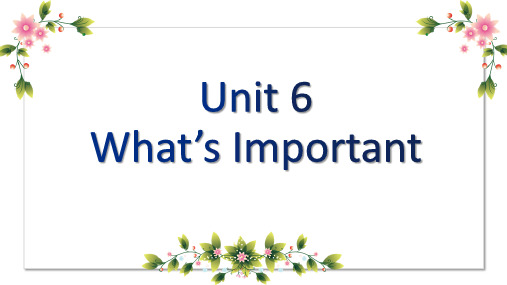
六、fashionable 流行的,时髦的 ----fashion 时尚
七、at the same time 同时 1、the same 相同的
Our product is over and above their product, and yet we sell it
用于否定句时,表示并列(不能用and)
This reminds me of Italy, when it was still a developing country. Young people there didn't just want to wear jeans; they wanted to wear Levi's. And sports shoes were not shoes unless they were Nike or Reebok. 这使我想起意大利,当它还是一个发展中国家的时候,那里的年轻人并不只 想穿牛仔裤。他们想穿的是Levi's这种名牌牛仔裤。除非耐克和锐步,其他 运动鞋对他们来说都不算是鞋子。 注:1.when引导时间状语从句
For the student mentioned above, nothing on earth can be more valuable than his father's love. If he realizes this, he won't have such complaints and will feel happy.
I‘m too busy these days. Please remind me to attend the meeting on
Friday. 这几天我很忙,请提醒我星期五去开会。
中职英语基础模块下unit6 定语从句word版本

3关系代词that
▪ That替代指人的先行词 在定语从句中主语 ,宾语。 做宾语时可以省略。
▪ Who is the man that is reading a magazine under the tree?
▪ that is reading a magazine under the tree 定 语从句替代先行词the man 在句中作主语
先行词
who是关系词
The man who came first is John.
(主语)
(谓语)
(定语从句)
先行词是指被修饰的名词或代词
关系词是指引导定语从句的词.可以分为 关系代词和关系副词 关系词作用: 1.起连接作用 2.替代先行词在定语从句中充当一定成分
2.结 构
定语从句的基本结构: 先行词+关系词+定语从句
all,everything,something,anything,nothing,no ne,one,much,little等)时,只能用that。
▪ All that we should do is useful to the people.
▪ We knew everything that was of great interest to us.
▪ Whose+名词=the +名词+of which
▪ Who lived in a house whose window faces south.
▪ The classroom whose door is broken will be repaired.
特殊情况
最新中职英语基础模块教案:Unit6(第四课时)

Unit 6 what’s your job?(第四课时教学设计)一、教材分析1.教学内容本课时系教材《英语1》(基础模块高教版)第一单元的第四课时,包括Unit task和self-check,具体内容为:复习巩固本单元所学内容和单元任务。
2.教学重点、难点⑴教学重点词汇、语法、单元任务总复习。
⑵教学难点单元任务。
二、教学目标1.知识目标⑴职业相关词汇⑵熟练掌握询问他人职业的句型。
(3)运用所学知识完成所要求的调查任务。
2.能力目标a)学生能用准确的句型询问他人的职业或谈论职业。
b)熟练拼写重点词汇。
3.情感目标让学生了解不同职业的特点。
了解自己的职业愿望,引导学生为自己的未来职业作出准备。
三、教学步骤Step 1 Lead-in1.Greeting.2.Revision.The teacher act out different jobs and have the students guess what they are. Ask the students to spell the words out.(设计意图:通过这一活动能帮助学生对于本单元重点词汇进行一个全面的复习并能检查的掌握情概况。
)3.RevisionShow them pictures of different jobs. Have a student come to the front facing the students. Have the student guess what is showed on the picture. He or she are supposed to use the sentence pattern: “Is he/shea …?” See who can find out the answers using the fewest questions. (设计意图:复习巩固“Is he/she a …?”。
语文出版社中职教材英语基础模块下册Unit6_2022年学习资料
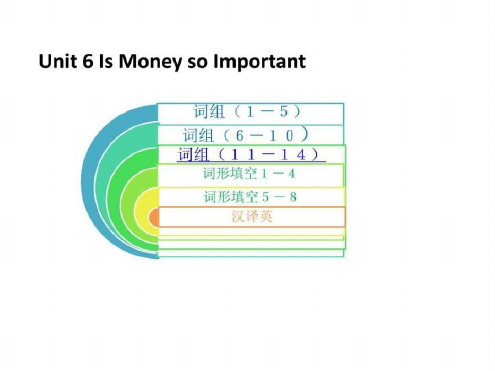
5We have no coffee.Would you like-a cup of tea-instea -6We cannot afford-such a large-apartment.-7All the f rmers have to work hard to-earn-their living.-8Why do s she always want to-show off-in front of our class?首页
Unit 6 Is Money so Important-词组(1一5-词组6一10-词组11-14-词形 空1一4-词形填空5一8-汉译英
useful expressions:-1.drive sb to-开车送…去-2.see sb doin -看见亲人在做…-3.remind...of-使…想起-4.instead of-代替;而不是-5.sho off-娃罪,卖弄-返后首页
A newspaper published a letter from a-father.The fath r said that his son-disliked him because he didn't-ea n-much money.The s-son felt unhappy-when he saw his c assmates wearing-famous brand clothes or being driven to school in a car.-报纸上刊登了一位父亲写的信。
This reminds me of Italy when it was-still a developi g country.Young people-there didn't just want to wear jeans;-they wanted to wear Levi's.And sports-shoes we e not shoes unless they were-Nike or Reebok.
中职英语基础模块第二版第6单元
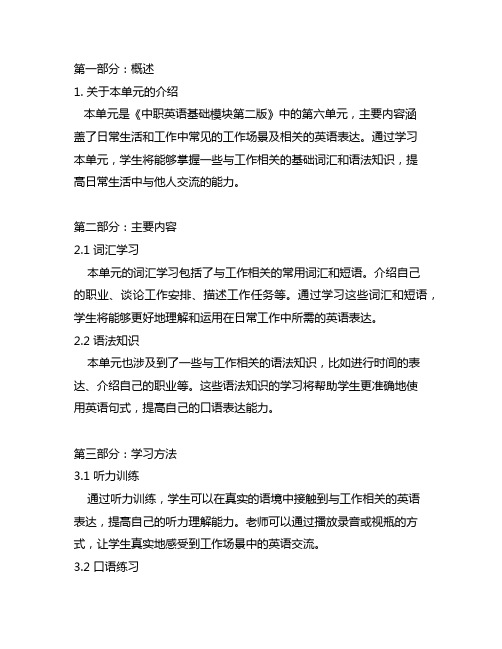
第一部分:概述1. 关于本单元的介绍本单元是《中职英语基础模块第二版》中的第六单元,主要内容涵盖了日常生活和工作中常见的工作场景及相关的英语表达。
通过学习本单元,学生将能够掌握一些与工作相关的基础词汇和语法知识,提高日常生活中与他人交流的能力。
第二部分:主要内容2.1 词汇学习本单元的词汇学习包括了与工作相关的常用词汇和短语。
介绍自己的职业、谈论工作安排、描述工作任务等。
通过学习这些词汇和短语,学生将能够更好地理解和运用在日常工作中所需的英语表达。
2.2 语法知识本单元也涉及到了一些与工作相关的语法知识,比如进行时间的表达、介绍自己的职业等。
这些语法知识的学习将帮助学生更准确地使用英语句式,提高自己的口语表达能力。
第三部分:学习方法3.1 听力训练通过听力训练,学生可以在真实的语境中接触到与工作相关的英语表达,提高自己的听力理解能力。
老师可以通过播放录音或视瓶的方式,让学生真实地感受到工作场景中的英语交流。
3.2 口语练习口语练习是提高学生英语口语能力的重要途径。
老师可以设计一些角色扮演的活动,让学生在模拟的工作场景中进行口语练习,提高他们的实际应用能力。
3.3 词汇和语法复习在学习过程中,学生需要不断地复习之前学过的词汇和语法知识,巩固所学内容。
老师可以设计一些课堂练习和作业,帮助学生更好地掌握所学知识。
第四部分:教学建议4.1 多媒体辅助教学在教学过程中,老师可以通过多媒体教学软件,如PPT、录音、视瓶等,向学生展示真实的工作场景和相关的英语表达,激发学生学习的兴趣,并帮助他们更快地理解和掌握所学内容。
4.2 创设真实场景可以通过课堂活动的方式,创设真实的工作场景,让学生在模拟的情境中进行角色扮演和英语交流,提高学生的英语口语能力,增强他们的学习体验。
4.3 分层次教学针对不同水平的学生,可以进行分层教学,让每个学生都能够在适合自己水平的教学环境中学习,做到学有所成。
第五部分:总结通过本单元的学习,学生将能够掌握一定量的与工作相关的词汇和语法知识,提高自己的英语口语表达能力。
完整版外研社中职英语基础模块修订版UNIT6

Key sentences:
1. Nancy will hav希今晚要和父母一起用晚餐。
2. Nancy is going to see the dentist this Saturday.
Listening and Speaking
3 Listen again and act. 再听录音,根据提示表演对话。
Listening and Speaking
S1: Hello? Who is that? S2: Hi, S1. It's S2. S1: Hey, S2, what's up? S2: Uh, well… how about visiting an amusement park this
weekend? S1: This weekend? I'd like to, but I can't. I'm going to visit my
grandparents this weekend. S2: Oh, that's too bad. What about next Sunday? S1: Next Sunday would be fine. When and where shall we meet? S2: How about 9 am, in front of the school gate? S1: Wonderful! See you at 9 am next Sunday.
Who will attend the meeting?
The boss, managers, engineers, Mr. Wang
Who will give a presentation?
中职英语 基础模块(下)unit6全部教案
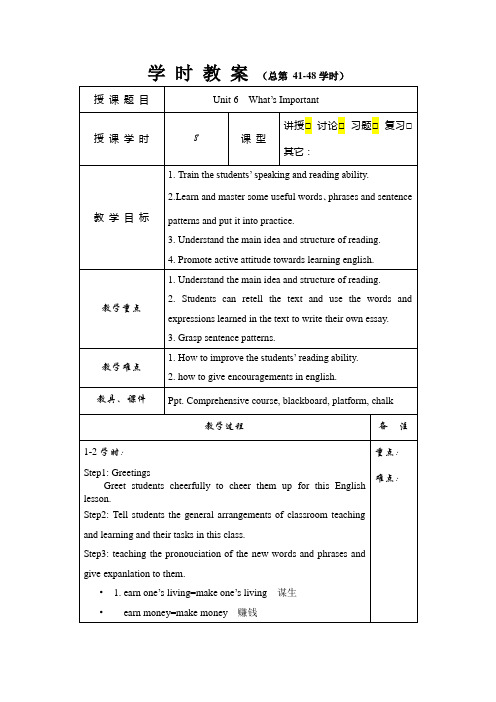
备注
1-2学时:
Step1:Greetings
Greet students cheerfully to cheer them up for this English lesson.
Step2:Tell students the general arrangements of classroom teaching and learning and their tasks in this class.
你总以为你自己是那么了不起。
e.g.Don’t eat that much.
8.Is someoneturning a littlegreenhere?
这里是不是有人感觉有点嫉妒呀?
重点
难点
课外学习引导及作业布置
1.Finish all the exercises after the text.
2.Review what we have learned.
5-6学时:
Step1:Greet the whole class
Step2: Retell the reading.
Step3:consolidation.
be pround of remind instead show off instead of unlesrent from yours.
be the same as
e.g.My book is the same as yours.
6. accept, receive(主观)接受;(客观)收到
I received some flowers yesterday. But I didn’t accept them.
Ithink…
1.Moneyis importantbecause…..
中职英语基础模块3 Unit 6 work experience 重点语法:定语从句

who joined the army for her father in ancient China.
that we Chinese use to compute, especially in ancient time.
Changing to the normal voice.
Sara: You see. You can make it. Lin Dong: OK, thank you very much, Sara.
句子做定语。或者在复合句中,修饰某一名词或代词的句子,叫做定语从句。
定语从句 attributive clause
Listen and underline.
Sara: Hello, Lin Dong, What’s wrong with you?
Lin Dong: Hi, Sara. I’ll have an interview tomorrow morning. I’m afraid I can’t
make it.
或者在复合句中,修饰某一名词或代词的句子, 叫做定语从句。
关名系先词 代行/词代词:词who+(w关ho系m词), (wh关ic系h, 代tha词t, /w关ho系se副词)+ 定语从句
定语从句的格式: 名词/代词 + 关系词(关系代词/关系副词)+ 定语从句
先行词 例句:We need a salesperson who can read the instructions for our products. 关系代词: who(whom), which, that, whose 关系副词:where, when, why
outgoing(外向的,好交际的),
中职英语-定语从句

5. why 与that, which 的区分 指时间,地点或原因的先行词在定语从句 中作主语或宾语,用which或that引导定 语从句。
why This is the reason ________ ( = for which ) I didn’t come here. The reasonwhich/that __________ she gave was not true.
1.that 与which
1.that 与which
1.This is the best TV _______ that is made in China. that he 2.The first museum _______ visited in China was the History Museum. B.先行词被形容词最高
The girl is Mary. We saw her yesterday.
关系代词的实质(2)
Join the following sentences:
The girl is Mary. We saw her yesterday.
The girl we saw her yesterday is Mary.
关系代词的实质(1)
Join the following sentences: A plane is a machine. The machine can fly. A plane is a machine that /which can fly.
关系代词的实质(2)
Join the following sentences:
在介词后面,指事物 用which,指人用whom “,”+which
2如何判断介词
语文版中职英语基础模块下册Unit6《What’sImportant》word教案
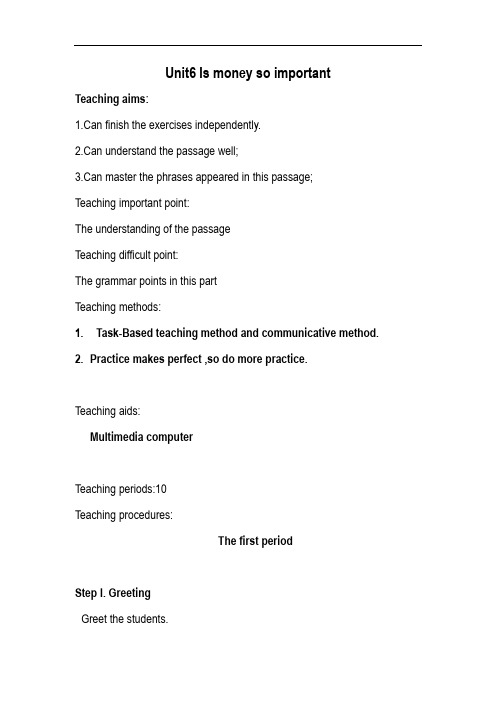
Unit6 Is money so important Teaching aims:1.Can finish the exercises independently.2.Can understand the passage well;3.Can master the phrases appeared in this passage;Teaching important point:The understanding of the passageTeaching difficult point:The grammar points in this partTeaching methods:1.Task-Based teaching method and communicative method.2.Practice makes perfect ,so do more practice.Teaching aids:Multimedia computerTeaching periods:10Teaching procedures:The first periodStep I. GreetingGreet the students.Step II. RevisionReview what they have learned in last class.1.Ask students to read aloud the words by themselves, each word twotimes;2.If their pronunciation are wrong, correct it.Step III. Reading.1.Extensive reading.Give students 3minutes to read the passage briefly. And answer the questions on page 52.2.Intensive readingAfter that, give students 5more minutes to read the passage carefully and thoroughly. And answer the questions of Reading Comprehension. Ask someone to read his or her answer to everyone, then let the others to check it.The correct answers are:Step IV. ExplanationAsk some students to read the passage paragraph by paragraph, then explain it to them.1 remind的用法:remind sb. of sth. ;remind sb. that …remind sb to do sth. …表示提醒某人做某事。
中职英语基础模块下册Unit 6 Music

New Words
Phrases
Notes
beat
lively brain active mood prefer classical follow lead power
n.adjΒιβλιοθήκη n.adj. n. v.
adj. v. n. n.
(音乐、诗歌等的)住节奏, 节拍
生气勃勃的,活跃热情的 智力,脑力
III. Listen to the following poem and repeat.
Dreams By Langston Hughes Hold fast to dreams, For if dreams die, That can never fly. Hold fast to dreams, For when dreams go, Life is a barren field Frozen only with snow.
1
mouth organ
Warm-up
Here are some articles related to music. Please write their names under the corresponding pictures.
2
drum set
Warm-up
Here are some articles related to music. Please write their names under the corresponding pictures.
中等职业教育课程改革创新示范教材 中等职业教育文化课系列规划教材
英语(基础模块)下册
Unit 6 Music
Objectives
1. 掌握英语中连读和失去爆破的发音规则,并能正确地模 仿、识读句子中的连读和失去爆破。 2. 掌握与本单元主题“音乐”有关的词汇、短语和句型, 并能灵活运用于日常会话。 3. 掌握时间状语从句的定义以及时间状语从句中不同连接 词的用法,了解时间状语从句中时态的运用。 4. 熟练掌握求职信的基本写法。
语文版中职英语基础模块下册1-6单元 必背语法(含短语与句型)
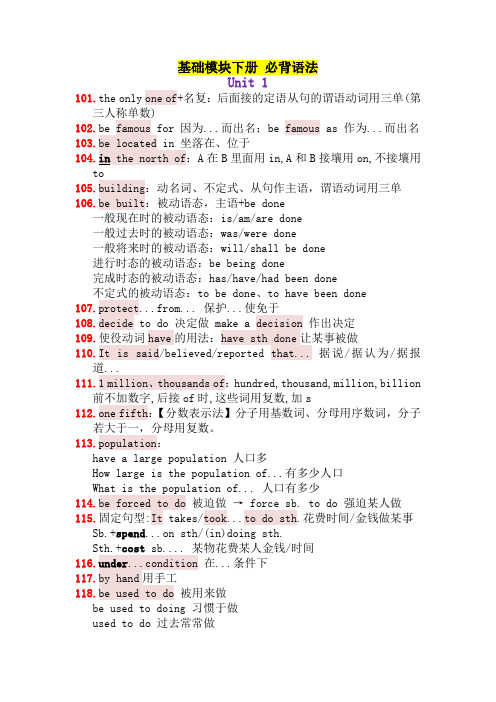
基础模块下册必背语法Unit 1101.the only one of+名复:后面接的定语从句的谓语动词用三单(第三人称单数)102.be famous for 因为...而出名;be famous as 作为...而出名103.be located in 坐落在、位于104.in the north of:A在B里面用in,A和B接壤用on,不接壤用to105.building:动名词、不定式、从句作主语,谓语动词用三单106.be built:被动语态,主语+be done一般现在时的被动语态:is/am/are done一般过去时的被动语态:was/were done一般将来时的被动语态:will/shall be done进行时态的被动语态:be being done完成时态的被动语态:has/have/had been done不定式的被动语态:to be done、to have been done107.protect...from... 保护...使免于108.decide to do 决定做 make a decision 作出决定109.使役动词have的用法:have sth done让某事被做110.It is said/believed/reported that... 据说/据认为/据报道...111.1 million、thousands of:hundred,thousand,million,billion 前不加数字,后接of时,这些词用复数,加s112.one fifth:【分数表示法】分子用基数词、分母用序数词,分子若大于一,分母用复数。
113.population:have a large population 人口多How large is the population of...有多少人口What is the population of... 人口有多少114.be forced to do 被迫做→ force sb. to do 强迫某人做115.固定句型:It takes/took...to do sth.花费时间/金钱做某事Sb.+spend...on sth/(in)doing sth.Sth.+cost sb.... 某物花费某人金钱/时间116.under...condition 在...条件下117.by hand用手工118.be used to do 被用来做be used to doing 习惯于做used to do 过去常常做119.be enough to do 足够做 enough:修饰名词时放前面、修饰形容词时放后面。
- 1、下载文档前请自行甄别文档内容的完整性,平台不提供额外的编辑、内容补充、找答案等附加服务。
- 2、"仅部分预览"的文档,不可在线预览部分如存在完整性等问题,可反馈申请退款(可完整预览的文档不适用该条件!)。
- 3、如文档侵犯您的权益,请联系客服反馈,我们会尽快为您处理(人工客服工作时间:9:00-18:30)。
Who lived in a house whose window faces south.
The classroom whose door is broken will be repaired.
特殊情况
1。先行词指物时,用that 而不用which的情况 1。先行词为指物的不定代词(
This is the house ___he visited last year. This is the house ___he lived last year.
关系副词why引导的定语从句
Why表示原因,常用在先行词reason后面, 在定语从句中作原因状语
固定句型the reason why…is that… I don’t know the reason why he was late this
Did you enjoy the days when we studied and lived in Amrican.(in which)
I still remember the days ___we studied together.
I still remember the days_____we spent studying together.
先行词
who是关系词
The man who came first is John.
(主语)
(谓语)
(定语从句)
先行词是指被修饰的名词或代词
关系词是指引导定语从句的词.可以分为
关系代词和关系副词 关系词作用: 1.起连接作用 2.替代先行词在定语从句中充当一定成分
3.关系代词
关系副词
起连词作用,本身又 即起连接作用,本
作从句中的主语、宾语、 身又在从句中作时间、
表语或定语
地点或原因状语
who, whom Whose Which That 没有what
When Where Why 没有how
何时可以省略?
做宾语时可以省略
先行词指人的定语从句
1关系代词who 替代指人的先行词,在定语从句中作主语 注意:从句谓语动词的人称和数要和先行词
3。先行词由序数词或形容词最高级修饰或是形 容词最高级转化的名词时,只能用that
This is the most beautiful paiting that I have ever seen.
The first book that he wrote in English is very popular.
Take as many as you want
Here is so big a stone as no man can lift.
注意:the same… that 与The same… as 的区别 The same …as表示同一类的 The same …that表示就是那一个 This is the same pen as I bought yesterday. This is the same pen that I bought
The girl that we saw yesterday is Tom’s sister
That we saw yesterday 定语从句替代先行词 the girl 在句中作宾语可以省略
4关系代词whose
Whose 替代指人的先行词的所有格,翻译为 “某人的 ”,在定语从句中做定语,后面接其 所修饰的名词.
As was expected
As we all can see
As we know
so……as中as必须在从句中担任成分(主语 、宾语等),而从句就是我们熟悉的定语从 句咯。
1。关系副词when引导的定语从句
When 表示时间,其先行词是表示时间的名 词(time,hour, day,year等)
When在定语从句做时间状语,可用“介词 +which”
I still remember the day when I joined the Communist Party.(on which)
1.什么是定语从 句
定语从句—Attributive Clause
定语是用来修饰名词或代词的词,
通常可以由形容词等来充当。
a beautiful school
形容词
名词
something impor名词 或代词,这个句子就叫定语从句。
定语从句可以修饰名词或代词,还 能修饰整个句子。定语从句修饰名 词或代词时,通常位于名词或代词的 后面.
all,everything,something,anything,nothing,no ne,one,much,little等)时,只能用that。
All that we should do is useful to the people.
We knew everything that was of great interest to us.
morning. The reason ___he made up was obviously
false. I would like to know the reason ___you
changed the plan.
4.定语从句分类
1。限制性定语从句
功能上对先行词起限制作用;是先行词不可缺 少的定语,不可以省略;形式上定语从句和主 句之间不能用逗号隔开;先行词是名词或代词; 限制性定语从句关系代词作宾语可以省略。
保持一致。 He is the man who wants to see you. 定语从句who wants to see you,who是关系
代词替代先行词the man,在句中作主语。
2.关系代词whom
替代指人的先行词 在定语从句中作宾语,可以省略在口语中可
用who代替whom I know the girl whom you talked to just now. 定语从句 Whom you talked to just now关系
2。非限制系定语从句
功能上对先行词附加说明;省去后不影响主句 的意思;形式上用逗号把主句和从句分开;先行 词是名词代词或者是短语或句子;非限制性定 语从句关系词不可以省略。
5.定语从句的做题原则方法
一找先行词 二带从句中 三判作成分 四选关系词
6。As 用作关系代词引导的定语 从句
learning spoken English.
3.先行词指人时,关系代词前有介词时,只 能用whom,不能用who或that
The man with whom he is talking is my classmate.
4。当主句是以who开头的特殊问句时,只能 用that,不能用who或whom
One who has nothing to fear for oneself dares to tell the truth.
Those who want to visit the museum must be at the gate by seven.
2.在非限制性定语从句,不用that I,who am going to Australia ,am busy
2.定语从句修饰主句或 主句的时
Tom won the first prize, which made his parents happy.
3.关系代词之前有介词时
The school in which Tom studied was very famous.
关系副词when,why,where引导 的定语从句
This is the best that has been used against pollution.
4。先行词中既有人又有物时,只能用that
He often talks of the teachers and schools that he visited in China . 5.当主句是以which开始的特殊问句时,只能用 that
2.先行词被不定代词以及the only,the very,the same, the last ,any,few,little等词语修饰时,只 能用that。
I have read every book that you gave me.
There is little water that can be used to water the flowers.
yesterday.
2.as引导非限制性定语从句
在引导非限制性定语从句中可以代替整个句子 或一件事,在从句中作主语宾语或者表语,意为 正如…,就像…;从句位置可置于主句之前或之 后,有时也可作为插入语至于句中,一般用逗号 和主句隔开.
As we all know
As is well known
词whom替代先行词the girl 在定语从句中作 宾语可以省略。
3关系代词that
That替代指人的先行词 在定语从句中主语 ,宾语。 做宾语时可以省略。
Who is the man that is reading a magazine under the tree?
that is reading a magazine under the tree 定 语从句替代先行词the man 在句中作主语
Which composition that you have read is better?
先行词指物用which而不用that的 情况
1。 在非限制性定语从句中
Beijing, which is the capital of China, is a very beautiful city.
